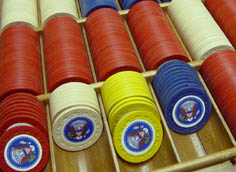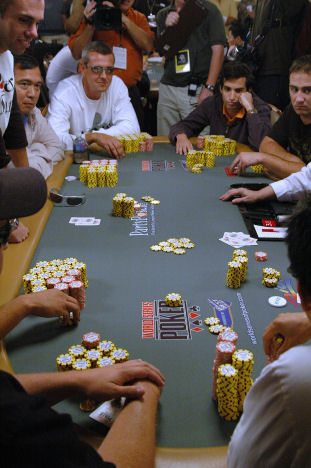Pokermania2.1w.lv is resource for learning how to play poker! We will explaine the poker rules for dozens of games, including all of your favorites like Texas Hold'em and Omaha, as well as Stud, Omaha hi-lo, 2-7 Single Draw and others. We recommend browsing around the site to find the poker rules you would like to learn.

If you are brand new to poker, you may want to begin by learning some of the more common/popular poker rules.
Almost every poker game, including the games played at the top poker sites USA, are based off of one of the four above games, so by learning those four games you will be able to pick up any other game relatively quickly. Or, you can browse our entire list of poker rules to see every poker game we explain on our site.
Poker is a family of card games that share betting rules and usually (but not always) hand rankings. Poker games differ in how the cards are dealt, how hands may be formed, whether the high or low hand wins the pot in a showdown (in some games, the pot is split between the high and low hands), limits on bets and how many rounds of betting are allowed. In most modern poker games, the first round of betting begins with some form of forced bet. The action then proceeds clockwise to the next player. Each player in turn must either match the maximum previous bet or fold, losing the amount bet so far and all further interest in the hand. A player who matches a bet may also raise, increasing the bet. The betting round ends when all players have either matched the last bet or have folded. If all but one player fold on any round, the remaining player collects the pot and may choose to show or conceal their hand. If more than one player remains in contention after the final betting round, the hands are shown and the winning hand takes the pot.
rankings. Poker games differ in how the cards are dealt, how hands may be formed, whether the high or low hand wins the pot in a showdown (in some games, the pot is split between the high and low hands), limits on bets and how many rounds of betting are allowed. In most modern poker games, the first round of betting begins with some form of forced bet. The action then proceeds clockwise to the next player. Each player in turn must either match the maximum previous bet or fold, losing the amount bet so far and all further interest in the hand. A player who matches a bet may also raise, increasing the bet. The betting round ends when all players have either matched the last bet or have folded. If all but one player fold on any round, the remaining player collects the pot and may choose to show or conceal their hand. If more than one player remains in contention after the final betting round, the hands are shown and the winning hand takes the pot.

With the exception of initial forced bets, money is only placed into the pot voluntarily by a player who, at least in theory, rationally believes the bet has positive expected value. Thus, while the outcome of any particular hand significantly involves chance, the long-run expectations of the players are determined by their actions chosen based on probability, psychology and game theory.
Gameplay
In casual play, the right to deal a hand typically rotates among the players and is marked by a token called a dealer button (or buck). In a casino, a house dealer handles the cards for each hand, but the button (typically a white plastic disk) is rotated clockwise among the players to indicate a nominal dealer to determine the order of betting. The cards are dealt clockwise around the table one at a time.
One or more players are usually required to make forced bets, usually either an ante or a blind bet (sometimes both). The dealer shuffles the cards, the player on the chair to their right cuts, and the dealer deals the appropriate number of cards to the players one at a time, beginning with the player to their left. Cards may be dealt either face-up or face-down, depending on the variant of poker being played. After the initial deal, the first of what may be several betting rounds begins. Between rounds, the players' hands develop in some way, often by being dealt additional cards or replacing cards previously dealt. At the end of each round, all bets are gathered into the central pot.

At any time during a betting round, if one player bets and no opponents choose to call (match) the bet and all opponents instead fold, the hand ends immediately, the bettor is awarded the pot, no cards are required to be shown, and the next hand begins. This is what makes bluffing possible. Bluffing is a primary feature of poker, one that distinguishes it from other vying games and from other games that make use of poker hand rankings.
At the end of the last betting round, if more than one player remains, there is a showdown, in which the players reveal their previously hidden cards and evaluate their hands. The player with the best hand according to the poker variant being played wins the pot. A poker hand comprises five cards; in the variants where a player has more than five cards the best five cards play.
Variantions
 Poker has many variations, all following a similar pattern of play and generally using the same hand ranking hierarchy. There are three main families of variants, largely grouped by the protocol of card-dealing and betting:
Poker has many variations, all following a similar pattern of play and generally using the same hand ranking hierarchy. There are three main families of variants, largely grouped by the protocol of card-dealing and betting:
Straight
A complete hand is dealt to each player, and players bet in one round, with raising and re-raising allowed. This is the oldest poker family; the root of the game as currently played was a game known as Primero, which evolved into the game three-card brag, a very popular gentleman's game around the time of the American Revolutionary War and still enjoyed in the U.K. today. Straight hands of five cards are sometimes used as a final showdown, but poker is currently virtually always played in a more complex form to allow for additional strategy.
Stud poker
Cards are dealt in a prearranged combination of face-down and face-up rounds, or streets, with a round of betting following each. This is the next-oldest family; as poker progressed from three to five-card hands, they were often dealt one card at a time, either face-down or face-up, with a betting round between each. The most popular stud variant today, seven-card stud, deals two extra cards to each player (three face-down, four face-up) from which they must make the best possible 5-card hand.
Draw poker
A complete hand is dealt to each player, face-down, and after betting, players are allowed to attempt to change their hand (with the object of improving it) by discarding unwanted cards and being dealt new ones. Five-card draw is the most famous variation in this family.
Community card poker (also known as flop poker)
A variation of Stud, players are dealt an incomplete hand of face-down cards, and then a number of face-up community cards are dealt to the center of the table, each of which can be used by one or more of the players to make a 5-card hand. Texas hold-em and Omaha are two well-known variants of the Community family.
Other games that use poker hand rankings may likewise be referred to as poker. Video poker is a single-player computer game that functions much like a slot machine; most video poker machines play draw poker, where the player bets, a hand is dealt, and the player can discard and replace cards. Payout is dependent on the hand resulting after the draw and the player's initial bet.
Strip poker is a traditional poker variation where players remove clothing when they lose bets. Since it depends only on the basic mechanic of betting in rounds, strip poker can be played with any form of poker; however, it is usually based on simple variants with few betting rounds, like five card draw.
Another game with the poker name, but with a vastly different mode of play, is called Acey-Deucey or Red Dog poker. This game is more similar to Blackjack in its layout and betting; each player bets against the house, and then is dealt two cards. For the player to win, the third card dealt (after an opportunity to raise the bet) must have a value in between the first two. Payout is based on the odds that this is possible, based on the difference in values of the first two cards. Other poker-like games played at casinos against the house include three card poker and pai gow poker.

